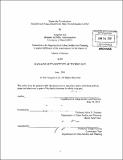Electricity privatization : should South Korea privatize its state-owned electric utility?
Author(s)
Lim, Sungmin
DownloadFull printable version (6.577Mb)
Alternative title
Should South Korea privatize its state-owned electric utility?
Other Contributors
Massachusetts Institute of Technology. Dept. of Urban Studies and Planning.
Advisor
Alice H. Amsden.
Terms of use
Metadata
Show full item recordAbstract
The state-owned electric utility, Korea Electricity Power Cooperation (KEPCO), privatization has been a key word in South Korea since 1997, when the government received $55 billion from the International Monetary Fund in exchange for a tough economic restructuring that included massive privatization. The Korean government separated KEPCO's six generation subsidiaries from KEPCO in 2001 in the initial process of the privatization. However, the government has not taken any further action since then. While there have been debates about the privatization of KEPCO, the debates were political rather than economic. This thesis will investigate whether or not Korea should continue to privatize KEPCO. First, it will examine how much revenue the government can make by selling its shares of KEPCO. Second, this thesis will study how much investment a privatized electricity industry will attract after privatization. Third, it will identify whether the electricity price will go down if the government privatizes KEPCO. Fourth, it will assess how the relationship between the government and the industry will change after privatization. Finally, it will identify how much does the government and people have to pay for the transition, which is caused by the change from a monopoly to a competitive market. By comparing the advantages and the disadvantages, this thesis will decide whether the advantages outweigh the disadvantages. This thesis will discuss only economic aspects; it will not examine the political, social and cultural aspects which are difficult to measure objectively.
Description
Thesis (S.M.)--Massachusetts Institute of Technology, Dept. of Urban Studies and Planning, 2011. Cataloged from PDF version of thesis. Includes bibliographical references (p. 77-80).
Date issued
2011Department
Massachusetts Institute of Technology. Department of Urban Studies and PlanningPublisher
Massachusetts Institute of Technology
Keywords
Urban Studies and Planning.